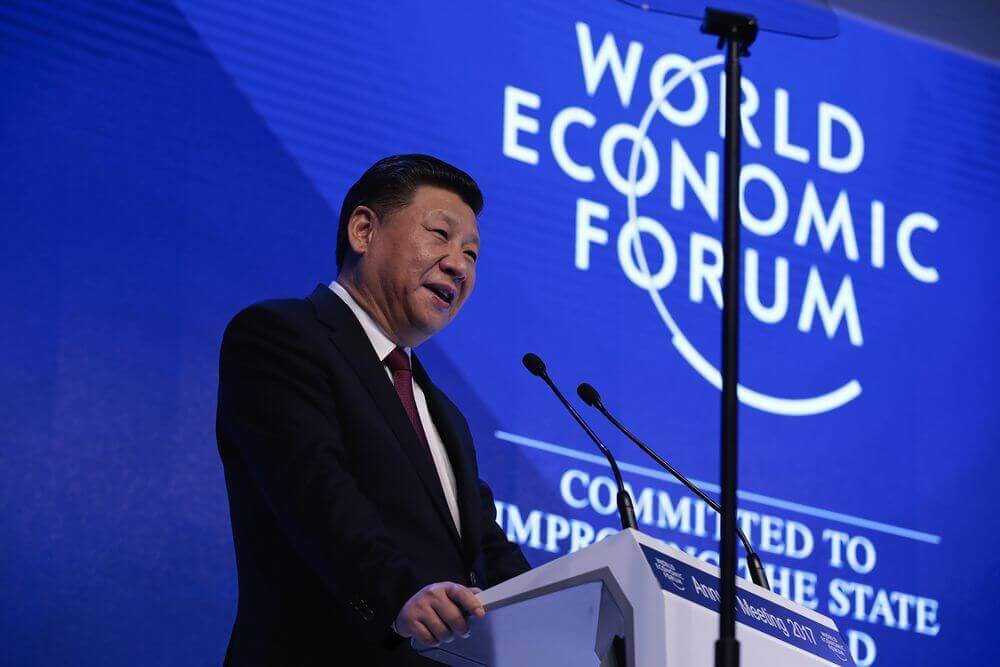Against a backdrop of rising international criticism of and tensions with China, President Xi Jinping delivered a special address at a World Economic Forum (WEF) virtual gathering, in which he called for unity and a renewed commitment to globalisation.
In a thinly veiled message to the United States (US), Xi warned the newly-inaugurated Biden administration against “build[ing] small circles or start[ing] a new Cold War”, saying that this would only result in further “division and conflict”.
Biden has suggested that the US will reaffirm its commitment to multilateralism after four years of relative isolationism under Donald Trump. However, it appears that the US-China tensions that characterised Trump’s term in office will continue under Biden, with the new President indicating that the US will seek to build alliances to counter China’s aggression.
Xi, on the other hand, called for countries to use multilateralism to “build an open world economy, firmly safeguard the multilateral trade system, and refrain from making discriminatory and exclusive standards, rules and systems, as well as high walls that separate trade, investment, and technology”. He remarked, “Coronavirus shouldn’t be an excuse for de-globalisation.” Therefore, he called for states to “abandon ideological prejudice and go on a path of peaceful coexistence”.
Amid continued international criticism of China’s actions in Hong Kong, Xinjiang, the East and South China Seas, the Line of Actual Control (LAC) with India, and its aggressive posturing against Taiwan, the Chinese President said that states must “avoid meddling in other countries’ internal affairs and resolve disagreements through consultation and dialogue”.
On the topic of the environment, the Chinese president that the country remains committed to reducing carbon emissions by 65% by 2030 and achieving carbon neutrality by 2060. He said, “Meeting these targets will require tremendous hard work from China. But we believe that when the interests of the entire humanity are at stake, China must step forward, take action and get the job done.”
Xi said that similar global collaboration is required in the field of global health, saying, “Containing the coronavirus is the most pressing task for the international community.” Accordingly, he called on states worldwide to accelerate vaccine development, production, and distribution and make it accessible to developing and poorer countries.
The name of the conference was aptly named “A Crucial Year to Rebuild Trust” and runs from January 25 to 29. Over 1,200 business, government, and civil society leaders from 60 countries will meet to discuss the Davos Agenda, which will be centred around the COVID-19 pandemic, economic recovery, and climate change. We are also expected to hear from Indian Prime Minister (PM) Narendra Modi, German Chancellor Angela Merkel, French President Emmanuel Macron, South African President Cyril Ramaphosa, South Korean President Moon Jae-in, Italian PM Giuseppe Conte, Israeli PM Benjamin Netanyahu, Jordanian King Abdullah II, Argentinian President Alberto Fernández, European Commission President Ursula von der Leyen, United Nations Secretary-General António Guterres, World Health Organisation Director-General Tedros Adhanom Ghebreyesus, International Monetary Fund Managing Director Kristalina Georgieva, and European Central Bank President Christine Lagarde, among several others.
China’s Xi Jinping Calls on States to “Abandon Ideological Prejudice” in Davos Speech
Xi Jinping delivered a special address at a virtual gathering of the World Economic Forum, and called on fellow members of the international community to renew their commitment to globalisation.
January 26, 2021

IMAGE SOURCE: JASON ALDEN / BLOOMBERGChinese President Xi Jinping at the 2017 World Economic Forum summit
